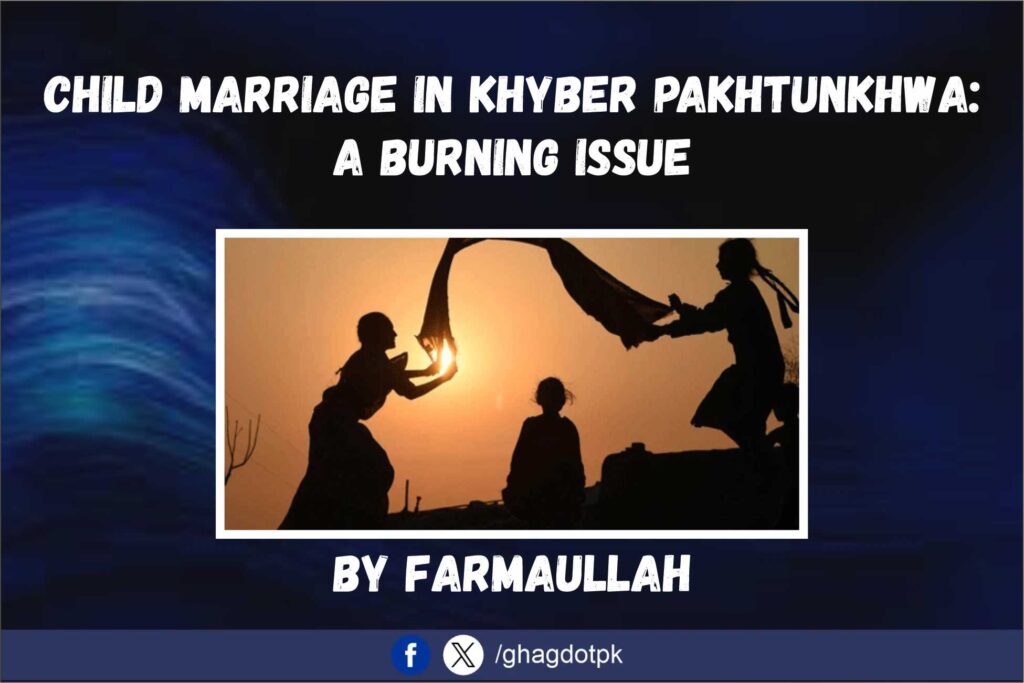By Farman Ullah
Khyber Pakhtunkhwa, one of Pakistan’s four provinces, is grappling with a critical social issue: child marriage. Despite efforts to curb the practice, KP reports the highest percentage of child marriages in the country.
Prevalence and statistics
The prevalence of child marriage in Khyber Pakhtunkhwa is alarming. According to UNICEF’s 2020 report, a staggering 29% of child marriages in Pakistan occur in the province. Furthermore, the Pakistan Demographic and Health Survey (2017-18) reveals that 21% of girls in Pakistan are married before the age of 18, with 3% married before the age of 15. These statistics are further substantiated by the National Commission for Human Rights, which reported 153 cases of child marriage in 12 districts of Pakhtunkhwa between May 2011 and December 2023.
Causes of Child Marriage in Pakhtunkhwa
Child marriage in Khyber Pakhtunkhwa is fueled by several underlying factors. Poverty plays a significant role, as families often view child marriage as a means to alleviate financial burdens. Traditional customs and cultural norms also perpetuate early marriages, particularly in merged districts.
Additionally, societal pressures weigh heavily on families, who face criticism and pressure from community members to marry off their daughters at a young age. Lack of access to education, especially for girls, further contributes to the prevalence of child marriage.
Lastly, entrenched gender inequality restricts women’s roles to domestic duties, limiting their opportunities and reinforcing the notion that marriage is their sole destiny. These interconnected factors create a complex web that perpetuates child marriage.
Consequences
Child marriage has devastating consequences for young girls in Khyber Pakhtunkhwa. Early pregnancies resulting from child marriage led to alarming rates of maternal and infant mortality. Additionally, child brides often drop out of school, perpetuating a cycle of illiteracy and lost opportunities.
Financial independence remains elusive, as child brides rely heavily on their husbands, hindering economic empowerment. The emotional toll is also severe, with child brides experiencing psychological trauma, emotional distress, anxiety, and depression.
Social isolation further exacerbates their vulnerability, limiting their interaction and mobility. These consequences collectively undermine the well-being, potential, and futures of young girls, emphasizing the urgent need to address child marriage.
Efforts to Combat Child Marriage
To combat child marriage in Khyber Pakhtunkhwa, a multi-faceted approach is necessary. This includes legislative reforms, such as amending the Child Marriage Restraint Act of 1929 to provide stronger legal protections. Awareness campaigns are also crucial, educating communities about the risks and consequences of child marriage.
Empowering girls through education, vocational training, and economic empowerment can help them make informed choices about their lives. Additionally, community engagement is vital, involving local leaders, elders, and influencers to shift societal attitudes and norms.
Challenges and Recommendations
To effectively combat child marriage in Khyber Pakhtunkhwa, several challenges must be addressed and recommendations implemented.
Firstly, existing laws must be strengthened and enforced to prevent child marriages. Additionally, addressing the root causes of poverty, lack of education, and gender inequality is crucial.
Raising awareness through community-based initiatives and media campaigns can also significantly change societal attitudes and norms.
Lastly, providing support to survivors of child marriage is essential, including counseling, healthcare, and economic support to empower them to rebuild their lives.
Child marriage in KP is a complex issue requiring multifaceted solutions. Addressing poverty, promoting education, and empowering girls are crucial steps. Strengthening laws and community engagement can also help. Collective action is necessary to protect the rights and futures of young girls in KP.






